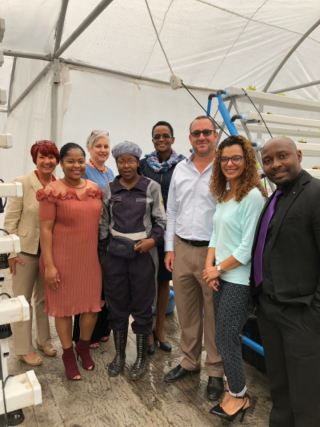Kuba Pioneering SMME Development with ‘Grow My Biz’
The key to recovering from our current unemployment crisis and stagnant economy will be Small, Medium & Micro Enterprises, now more than ever it is vital we put concerted focus and resources into SMME development and support.
The Kuba vision is two-fold; to facilitate access and trade between the informal market and formal businesses on the marketplace and supporting SMMEs by providing them with the necessary tools and resources to formalise their businesses to compete in the broader formalised economy. There are many ways to measure needs and growth, working in the informal market space we’ve learned that entrepreneurs and SMMEs have varied needs and their own ideas on what growth is that the market is often not offering. Our Kuba users have been clear that access to market and marketing their businesses effectively are their biggest challenges and so we developed the Grow My Biz packages.
The Grow My Biz packages are designed for SMMEs in various stages, the free Starter package only requires business owners to sign up on the Kuba marketplace, use the free invoicing software and contact us on anything they need via Kuba’s dedicated WhatsApp support. The Popular package is a good investment including company registration, a personally designed website, web hosting, business email addresses and a digital flyer for R550 per month. Not enough small businesses focus on online marketing as South Africa is still developing access to affordable internet and the skills required to effectively use it. For less than R1000 a month with the Premium package Kuba provides SMMEs with Search Engine Optimisation & Marketing with Google Ads, giving them business support and a Digital Marketing service while also promoting their business and services on Kuba’s social media platforms.
This is what Kuba’s Grow My Biz is about, giving SMMEs of all shapes and sizes options that suit their budgets and needs by extending the tools to reach their full potential and facilitating access to an organised marketplace full of customers in need of reliable local services. When we invest in local SMMEs we improve the quality of products & services, we expand entrepreneurial vision of what is possible and ultimately empower our communities to take control of their economic future.
For more information on Kuba
Mihlali Mbobo
Public Relations & Communications
This email address is being protected from spambots. You need JavaScript enabled to view it.
https://kuba.services
+27 (0)83 960 1127
9 Portswood Road,
Waterfront,
Cape Town
8001
Rooftop farms may be next big thing in agri-business - Signium Africa
Rooftop farms may be next big thing in agri-business – Signium Africa (www.signium.co.za)
City-wide hydroponic rooftop farming co-operatives have the potential to become the next big thing in commercial agriculture. The prediction comes from Signium Africa, an executive search and talent management company with a large book of agri-business clients in South Africa and across the sub-Saharan region. Annelize van Rensburg, director responsible for Signium Africa’s agriculture portfolio, says first signs of the rooftop farming explosion are already evident, with black small-scale entrepreneurs in the forefront.
Van Rensburg notes: “We work for major corporates in the agricultural industry, but stay close to all important developments in the sectors we serve and the growing potential of hydroponic-based rooftop gardens in inner cities is the biggest trend on the mid-term horizon.
“Many of today’s big agri-businesses began as farming cooperatives that were formed decades ago when farmers banded together to achieve economies of scale and secure sustainable profits. The burgeoning growth of individual rooftop farms suggests similar potential exists for the formation of city-wide cooperatives by rooftop farmers. “The trend is taken seriously by the banks and organisations like Agbiz, the agricultural business chamber.
We expect critical mass in the next couple of years.” Rooftop farms are created when ‘agripreneurs’ rent empty space on the top of city buildings and use water-efficient hydroponic cultivation to grow vegetables and other crops. Inner city locations create logistic efficiencies as the farms are within walking distance of their target market – city dwellers looking for affordable food sources.
Karen Grobler, Agbiz marketing and communications manager, confirmed the organisation monitored transformation initiatives, including rooftop farms, and was excited by prospects. She says: “Our focus is on established formal business, but these small-scale entrepreneurs certainly have potential for sustained growth. We’re particularly impressed by the resourcefulness of these industry entrants.
“They are often businesswomen with a talent for creating solutions. For instance, some are looking at bio-reactors and solar energy to reduce their reliance on the electricity grid as hydroponics need a dependable power source. They already supply local retailers. Further growth can be expected.” The banks are also close to rooftop developments. Loffie Brandt, head, sales enablement, at Absa Bank, says there is “significant future potential for a massive uptick”.
He adds: “It is certainly a space where we could play in as finance is needed by all growth-minded business. Size is not always essential as with hydroponics there is potential for high-volume production at a single site. This suggests commercial viability could be achieved by small, individual operators.” One highly successful agripreneur, Sibongile Cele, has already demonstrated the growth potential up on the roof.
Her Mcebo Wealth Rooftop Farm has been supplying organically grown produce for more than two years. Crops include lettuce, spinach and herbs. The hydroponic system employs metal racking for maximum space efficiency, enabling vegetables to be grown ‘off the shelf’. Her operations in Hillbrow, Johannesburg, were funded by the Small Enterprise Development Agency and she currently reaches retail markets via an agent. She says: “I have an accounting background, so commercial success is important to me, but I also have a social mission. Providing food for the community gives me a sense of purpose.
It is also important to set an example for other women and show we can be successful, run businesses and provide food for our families and communities. “This is only the start. The sky’s the limit for rooftop farming.” Ends
Signium Africa (previously Talent Africa) is a leading South Africa-based executive search and talent management company servicing sub-Saharan Africa.
Website: www.signium.co.za Tel: +27 11 771 4800 Issued By: Tale Spin Media & Marketing Zelda Williams 082 461 0689 or Gillian Schmid 082 960 3233 This email address is being protected from spambots. You need JavaScript enabled to view it. This email address is being protected from spambots. You need JavaScript enabled to view it.
Economic Spotlight on Southern African Entrepreneurs in Industry 4.0
The SABTIA Africa Tech Conference, in partnership with the City of Eukurhuleni and Monash SA, has kicked off with Minister Lindiwe Zulu addressing key priorities for re-energising business incubation programmes in South Africa.
[City of Ekurhuleni, Gauteng, September 25] International industry experts are in attendance at the First Africa Tech Conference, hosted by the Southern Africa Business and Technology Incubation Association (SABTIA) in partnership with the City of Ekurhuleni and Monash SA. The two-day conference, held at Emperors Palace in Johannesburg, is focusing on innovation in business incubation and acceleration, repositioning the sector to prepare and sustain the entrepreneurship ecosystem for the future.
Speaking at the event, Minister Lindiwe Zulu, highlighted the critical need to reduce the crippling effects of government bureaucracy on small business growth. “Africa is no longer playing catch up with the rest of the world, we are competing with it. And we are competing in a digital economy with a rate of change faster than the world has seen for the last 300 years. Through SEDA and initiatives like the SABTIA Tech Conference, we can unlock the economic potential of South African Entrepreneurs, enabling them to access high quality and innovative business support. We also have to ensure that we are driven by local realities and ensure that our support mechanisms are relevant to the South African realities of rural and township economies.”
Other key debates coming out of the conference include: The launch of the South Africa Business Incubation Conference in November. Integrating the new skills sets, required for Industry 4.0 and the knowledge era, into our education institutions. Ensuring the implementation of cross-departmental (transversal) agreements inside Government (i.e agreements between DSB and DST) which will support inclusive innovation and development. How to localise critical global content and best practice.
Tiro Matjiu, Founder of Uhuru shop and accelerator platform Uhuru Group, explains the biggest challenge in his sector as market access. “Marketing in an economic downturn is tough, even more so when your industry requires a shift in consumer mindset. Buying local is at the core of Uhuru’s SMME clients and without bold and innovative marketing strategies we will fall behind. Industry 4.0 is a huge opportunity for growth – but it requires knowledge, mentorship and training.” “Incubators, traditionally designed as support systems, are developing into growth acceleration mechanisms, critical to the improvement of the SMME success rate. SABTIA aims to build a more inclusive incubation and acceleration system which will better serve small businesses and start-ups, including those in the informal sector – a sector that has largely been ignored by incubation programmes in the past,” says SABTIA Chairperson, Zaid Mohidin.
Southern Africa Business and Technology Incubation Association (SABTIA) is an independent and private association formed to promote and coordinate business incubation in Southern Africa. SABTIA was set up to serve as the industry standard practitioner and members association, by providing the dissemination of knowledge, skills, training and expertise to the ecosystem nationally, continentally and internationally through partnerships with SEDA, DSBN, EBN as well as INBIA.
With the industry entering a new cycle we see more and more countries not only consolidating their ecosystems but more importantly also ensuring that appropriate local models are developed in alignment with global standards. The push to cross-pollinate and to collaborate to develop effective ecosystems – with best practices and standards – is fast becoming a priority. SABTIA has been reformed to address this priority.
Twitter: @SABTIA_Org
Facebook: Sabtia.org
Linkedin: SABTIA
### If you would like more information about this topic or for any interview requests, please call Nicola Brown at 071 883 5584, or email This email address is being protected from spambots. You need JavaScript enabled to view it..



